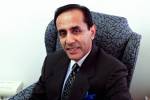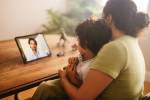Las Vegas doctor all too familiar with pain
Not long after our family dentist was diagnosed with a brain tumor, he walked out of his Michigan home and blew his head off.
The suicide note, my parents learned, related how our dentist didn't want to deal with the pain that the tumor was sure to bring.
I was in grade school then, and that tragedy was my extreme introduction to the fact that medical practitioners are just like the rest of us when they're hurting or become ill -- stressed out and scared.
Rarely, of course, do we see that side of them. We often see them when we're stressed out and scared, and then for only a few minutes, as they typically tell us in a well-reasoned, stoic fashion that a diagnosis can be managed with sophisticated surgery, powerful medications and some of our own "discomfort."
So when we do see a physician hurting, as Dr. Dale Carrison was the other day, it's jolting.
There he was, the chief of staff and head of emergency at University Medical Center, grimacing as he dragged his legs behind a walker and entered the waiting room of neurosurgeon Dr. William Smith. I was there on a story about a child who had pulled furniture and a TV down on his head.
"Don't let anybody tell you different, back operations hurt," Carrison said after he checked in at the reception desk. "This is my first day out of the house since the operation. The pain is bad."
Because of their friendships with other medical professionals, physicians or dentists are rarely seen in a waiting room. They generally go in the back door or schedule an appointment when other patients aren't there.
But Carrison is, well, Carrison. He ran an auto parts store and worked as a deputy sheriff and FBI agent before he decided he wanted to contribute more to society and became a physician at the age of 51.
He has kicked down doors to take down felons, parachuted out of a plane without training on a dare from another FBI agent, and whipped around the Las Vegas Motor Speedway on a motorcycle at speeds well more than 100 mph.
Now 71, he's had his share of medical trauma. Motorcycle crashes broke bones, a diving accident left him temporarily paralyzed.
He also has a condition that often sees his heart begin to beat far too fast.
On 30 occasions he's gone through what is now a staple of TV medical dramas. A doctor yells "clear" and paddles are used to shock Carrison's heart back into rhythm. Once, when the anesthetic wore off too quickly, he felt the entire shock slam through him, Nurses say his screams probably could be heard outside UMC.
"I hated to get a back operation because 50 percent of them don't work," Carrison said as he tried to get comfortable in the waiting room chair. "But the pain got so bad and I started to lose feelings in my legs, so I really didn't have a choice. The only good thing about this is I'll probably be a better physician because I'll relate to patients even better."
While he said he understands why many physicians keep an emotional detachment from patients -- to prevent burnout -- he said he can't practice that way. Nurses say he sometimes tearfully hugs patients who receive a life-changing diagnosis.
"I don't know how to be caring without emotional involvement," he said.
When patients are nervous before a surgery, he tells them he still gets that way.
Just before Carrison, who hurt his back weightlifting, was called to see the doctor, he said he had no misconceptions about surgical results, nor did he want patients to have them.
"You're probably going to have pain for after surgery, not discomfort," he said. "And most surgeries aren't going to make you feel as good as you once did, but generally better than you were when you had to go to the doctor. What people see on TV, patients feeling perfect after surgery, is a fairy tale that leads to a lot of unnecessary lawsuits."
Paul Harasim is the medical reporter for the Las Vegas Review-Journal. His column appears Mondays. Harasim can be reached at pharasim@reviewjournal.com or 702-387-2908.























